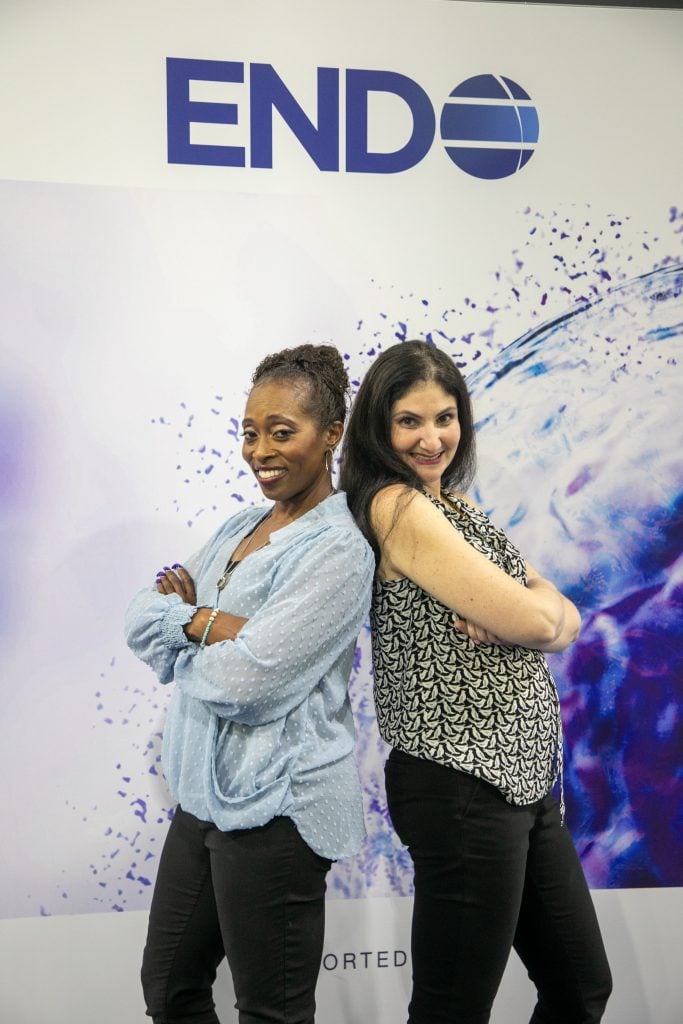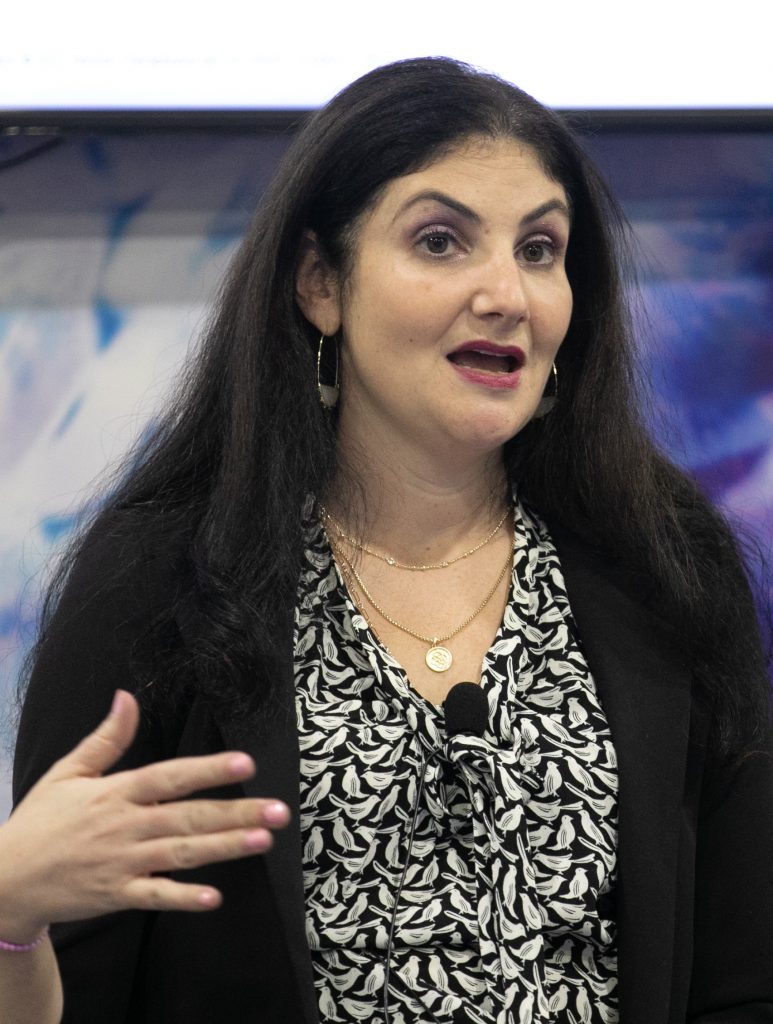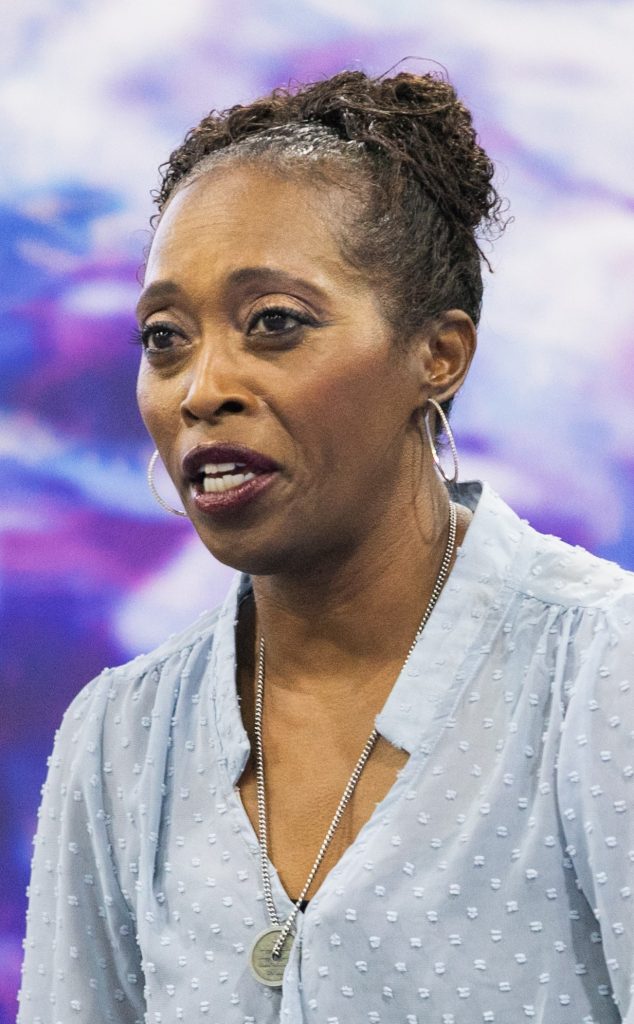
Amidst of the throngs of ENDO 2022 attendees, Olympian Gail Devers took centerstage to discuss living with and overcoming Graves’ disease and thyroid eye disease. She teamed up with endocrinologist Eve D. Bloomgarden, MD, to tout the importance of patient/physician teamwork and why patients need to champion their own healthcare.
In a lot of ways, Gail Devers – the three-time Olympic gold medalist and track and field legend – speaking at ENDO 2022 in Atlanta was the perfect choice for the Endocrine Society’s annual meeting. Devers’ journey back from a Graves’ disease diagnosis in 1990 and subsequent thyroid eye disease (TED) to taking home gold in the 1992 Summer Olympics in Barcelona and then two more gold medals in Atlanta in 1996, can stand as a parable for the comeback of the in-person meeting after almost three years.
Hurdles cleared. Smiles and cheers. Celebrations all around. But always more work to be done.
During her talk, Devers brought out a shiny blue cape with an E embroidered on it, a clear symbol that she considers endocrinologists heroes. But her struggle with Graves’ disease and TED seems like a familiar refrain. It took her two and a half years to finally get a proper diagnosis, and as she pointed out in her presentation, we are still talking about patient struggles like hers 30 years after her initial diagnosis – not exactly a sprint, but a marathon, and one that will require the efforts of many to cross the finish line. Or, endocrinologists as part of a relay team.
“We’re all for one common goal,” Devers says. “And for me going through what I went through. if you’re my doctor, I’m coming to you and I’m looking for help. I try to stay in my lane. This is your lane. I’m coming to your lane asking you for help. I’m pouring myself out because it’s very debilitating and I need to be able to get my life back. I need to understand why I feel like I can’t do this.”
Patient as Advocate
Up to half of Graves’ disease patients develop TED, characterized by “bulging” or protruding eyes, staring, and double vision, symptoms that, for now, patients simply must live with. But there is hope on the horizon, new drugs and therapies that should start to give patients and providers more optimism.
Eve D. Bloomgarden, MD, director of Thyroid Care and Endocrine Innovation and Education for the Division of Endocrinology at NorthShore University Health System in Bannockburn, Ill., joined Devers on the stage to talk about the Olympian’s journey to a TED diagnosis and how endocrinologists can identify symptoms early and consult with a TED eye specialist. Bloomgarden is well aware of the hurdles that still need to be cleared, the distances that need to be covered faster.

“I think that we know the delay in diagnosis of TED can be years to decades. And that means there’s years to decades of symptoms and significant impacts on quality of life. So, the sooner that we can make the diagnosis, the sooner we can treat and make people feel better. And really, I think whether it’s a marathon to a sprint or something in between, but certainly shortening that timeframe.”
Eve D. Bloomgarden, MD, director, Thyroid Care and Endocrine Innovation and Education, Division of Endocrinology, NorthShore University Health System, Bannockburn, Ill.
“I think that we know the delay in diagnosis of TED can be years to decades,” Bloomgarden says. “And that means there’s years to decades of symptoms and significant impacts on quality of life. So, the sooner that we can make the diagnosis, the sooner we can treat and make people feel better. And really, I think whether it’s a marathon to a sprint or something in between, but certainly shortening that timeframe.”
Both Devers and Bloomgarden in their talks acknowledged the shortage of endocrinologists contributing to these delays in diagnosis and treatment, the quality-of-life issues. According to Bloomgarden (and a paper recently published in JCEM), currently there is one full-time endocrinologist for 41,000 patients who need endocrine care, the largest mismatch of any specialty.
“I think what we need to get better at is innovation and thinking of ways to scale our knowledge, whether it’s to general practitioners or some way to reach patients directly on a different scale so it’s not one to one, but one to 1,000,” Bloomgarden says. “I think it’s the only way, getting awareness out. Once people know what questions to ask or who to see or what to bring to their physician’s office, that’s game changing. But we aren’t reaching a lot of people and a lot of people are still walking around without a diagnosis.”
For Devers, the responsibility falls on the patient as well. In talking about her experience with TED, she spoke about the need for patients to advocate for themselves and not be embarrassed or ashamed to ask questions or tell them what’s happening, even things that patients may be keeping from their own families. “When you show up at the doctor and you’re having these problems, you just say, ‘Look, doc, I can’t drive at night. I can’t read anymore,’” she says.
Restoring Trust in Medicine
Patients with TED often can’t drive, can’t read, can’t even watch television anymore. Some patients are afraid to go out in public for fear of their appearance making others uncomfortable. Devers says she feels lucky, all things considered, but remains committed to helping others, and adamant that no one should just lie down and take this: “Fortunately for me, my job is to go around and talk. But for someone who has a normal nine-to-five job, who works on a computer, who can’t get to work…this disease is very debilitating. So yes, be your own advocate. But also understand a doctor can’t make a proper diagnosis if you don’t tell him or her everything that you’re feeling.”
“Don’t feel embarrassed,” she continues, “Don’t feel like ‘This is my new set of normal and I’ll just deal with it.’ Or that you should be happy just to be alive.”
A simple way to approach it, but not always easy. Bloomgarden says that health literacy is very low for people without medical degrees. “It’s not like an intelligence thing; it’s just truly hard to put the onus on the patient to know what to ask and it’s more important to share it with the people who have higher health literacy, who are taking care of people every day in the medical world,” she says. “And I think restoring trust in medicine is something that we know is really essential.”
At one point early after her Graves’ disease diagnosis, Devers was treated with radiation, which carried with it a suite of adverse effects, starting with her feet, so she thought the best course was to seek help from a podiatrist. “I totally forgot to tell the podiatrist that I was being treated for Graves’ disease, but it was like okay, ‘That just has nothing to do with that. What you have is athletes’ foot,’” Devers says. “Nobody should have to go through that. I keep telling people I’ve suffered for everybody in the world. You don’t have to do that. This is how we’re going to alleviate that. We’re going to educate ourselves.”
Devers and Bloomgarden suggest that patients and providers both have a list of questions. Devers takes it even further, keeping a journal and writing down everything she’s feeling. “So even my doctor thinks I’m crazy. Or he knows I am!” she says with a laugh.
An Innovation Wakeup Call
Devers started educating other patients with Graves’ disease who would reach out to her, making sure to form bonds and learning how to ask for and lend help as needed, to support each other through things impacting them physically and mentally. And now her mission has brought her in front of the largest group of endocrine specialists in the world, in person for the first time in more than two years. “Now it’s time to expand that branch,” she says. “Now we’re reaching out to medical professionals, to give them extra tools and arsenal.”
For Bloomgarden, Devers’s story is wakeup call for innovation in the healthcare system. “Her story is really impressive,” Bloomgarden says. “And I think stories like this just emphasize that we have to start redesigning the delivery of healthcare so that we can actually treat the patients that need us.”

“We’re all for one common goal. And for me going through what I went through. if you’re my doctor, I’m coming to you and I’m looking for help. I try to stay in my lane. This is your lane. I’m coming to your lane asking you for help. I’m pouring myself out because it’s very debilitating and I need to be able to get my life back. I need to understand why I feel like I can’t do this.”
Gail Devers, Olympic Gold Medalist/Patient Advocate
And again, Devers likens how she would like to see that redesign: patients, endocrinologists, and other providers as part of a relay team, handing the baton with care, not passing it off too early or improperly, not impeding others. And she’d like to see the team pick up the pace; after all, the goal in a relay race is to reach the finish line, but always with the baton safely in hand. And the first step off the block is awareness.
Here Devers makes up a number, saying if there are five million Americans with Graves’ disease, “we can’t stop until five million Americans know it,” she says. “The hardest part about Graves’ disease is not the disease itself. It’s the not knowing.”
“Yes, it’s a rare disease, but rare does not mean less important,” Devers says. “It just means not enough people know about it. I’m not even going to say not a lot of people have it; it’s just not enough people know about it. So, we’ve got to change that. That’s number one. The sooner we change that, then it leads to the second part of knowing that 50% of those will develop or may develop TED. You don’t want TED living with you. That’s like having a rental and you let somebody stay in your rental for several years.”
Bagley is the senior editor of Endocrine News. He wrote about this month’s CEU sessions on hypo- and hyperthyroidism as well as on the pituitary sessions in the August issue.

